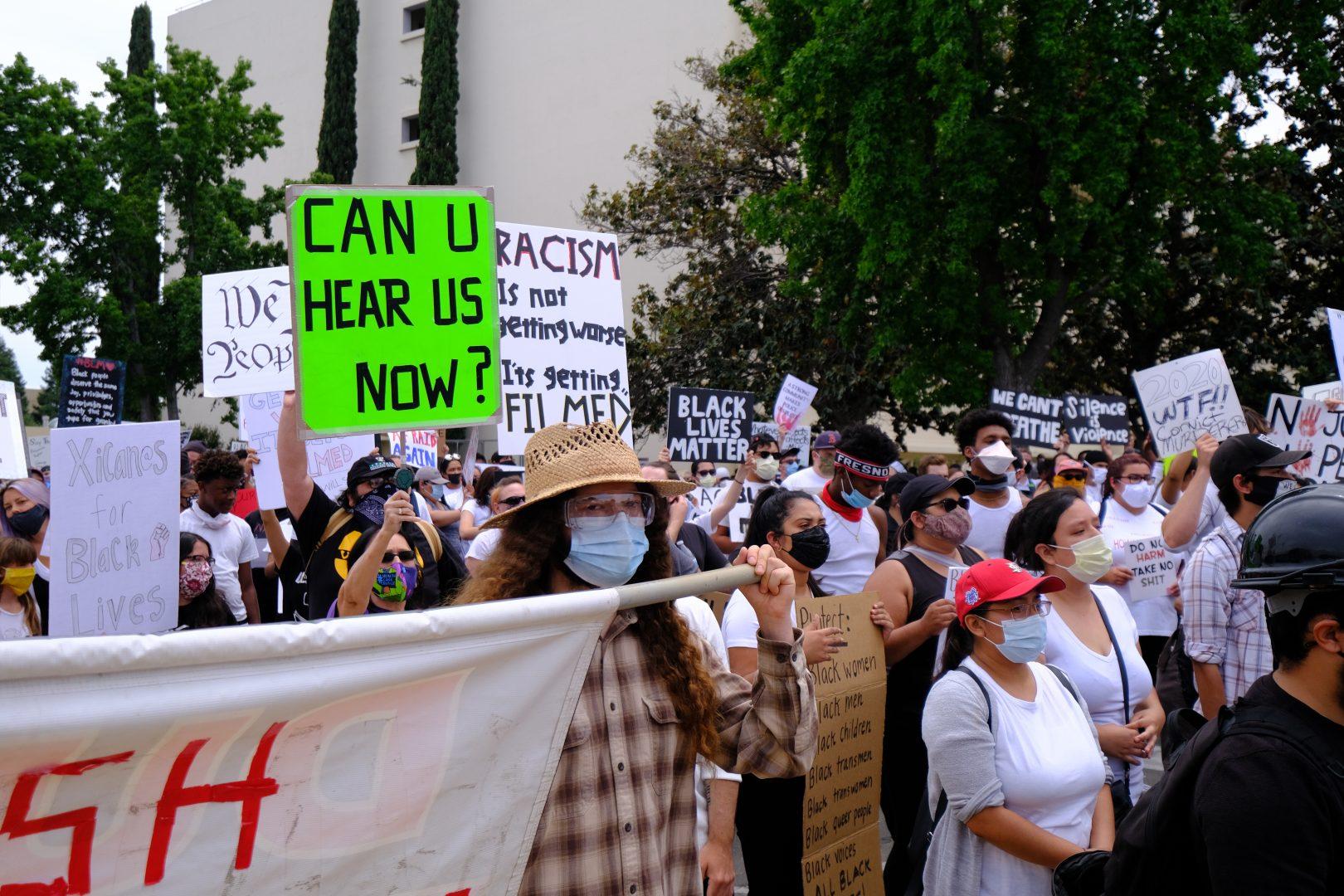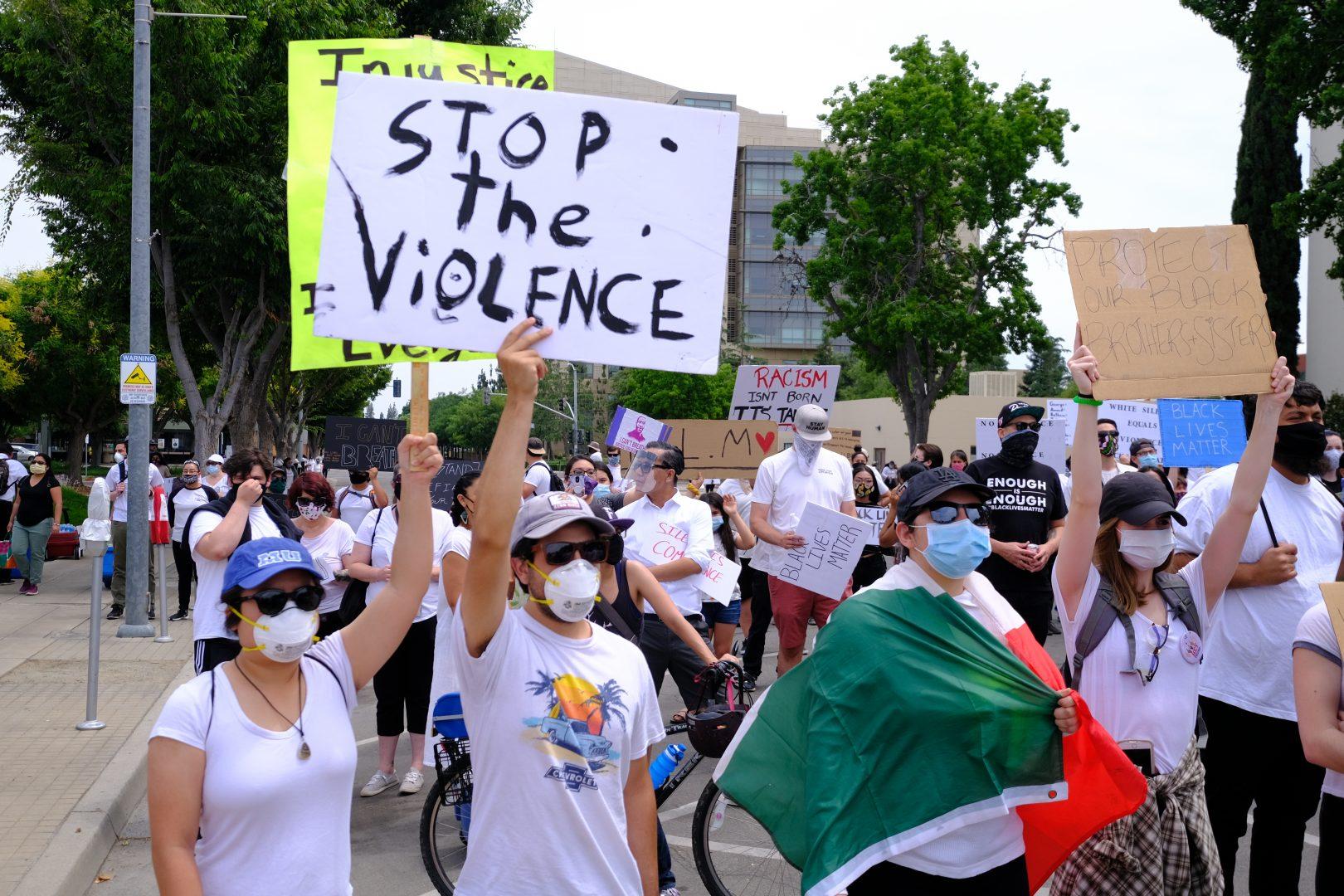Story written by Anthony De Leon and Zaeem Shaikh
As protests across the nation rage on for the sixth day in a row in response to the death of George Floyd in Minneapolis, a number of them have turned from peaceful to violent altercations exchanges between demonstrators and police departments.
But in downtown Fresno, the scene was different as thousands of demonstrators peacefully marched and expressed their frustration with the killing of Floyd and many other black people by the hands of the police.
Floyd, a 46-year-old black man, was killed while being detained by the Minneapolis Police. Numerous videos show Floyd being beaten by police and held down, while an officer placed a knee on his throat, causing him to succumb to his injuries.
As the demonstration began at 2 p.m., crowds gathered at Fresno City Hall on Sunday afternoon, holding up signs that read “Black Lives Matter” and “Racism is not getting worse. It’s getting filmed.”
Current president of the Fresno State chapter of the National Association for the Advancement of Colored People (NAACP) D’Aungillique Jackson, political action chair Denise Rogers-Heydt and political activist Joshua Slack were just a few of the speakers addressing the crowd on Sunday.
Jackson, Rogers-Heydt, Slack and the Fresno State NAACP were the main organizers who set up the protest titled, “#WECAN’TBREATHE,” through Facebook on Friday night, and in just a few hours hundreds of people said they were interested to attend.
The event was a collaboration between the Fresno State NAACP and the City of Fresno, as Jackson worked with city officials to make the event possible. The city had closed off parts of O street, Fresno Street, M street and Tulare street to traffic, so protestors could walk on the streets with no issues.
“Myself [Rogers-Heydt], D’Aun and Josh Slack found out that protests were happening with a lack of black voices and black organizations,” Rogers-Heydt said. “We had to take it [organizing] over, so that we could make sure that black issues were being addressed.”
During her opening statements, Jackson addressed the crowd thanking organizers and stating that Sunday’s event was the first protest organized by black people.
“We have seen rioting using the hashtag, “Black Lives Matter,” with no black lives being considered. That is an issue. This is what happens when you include black people in our own struggle,” Jackson said.
Jackson continued her statement by emphasizing that the protest would be, “110 percent peaceful.”
Rogers-Heydt also addressed the crowd with statistics on African-American income, unemployment, racial profiling by police, officer involved shootings and the budget amount in the general fund given to the Fresno Police Department, which caused her to break down during her speech.
“I am sorry I am getting emotional, but I know what west Fresno looks like,” Rogers-Heydt said. “And the fact that they [the city of Fresno] spend more than 50 percent on the police department…is devastating.”
At City Hall, Slack gave his own speech as well. When writing it, he said he felt like he needed to speak as if this is like a civil rights era movement, utilizing his skills as a former theater major at Fresno State.
“There are two viruses going on in this world, the coronavirus and white supremacy, and they are both killing black bodies, and they are both disproportionately affecting us, and they are both in dire need of a vaccine,” Slack said. “Unlike the coronavirus, which is relatively new, white supremacy has gone on far too long.”
The march started at Fresno City Hall, and demonstrators made their way to the Fresno Police Department plaza, chanting “No justice, no peace” and “Say his name: George Floyd” in the streets of downtown.

As several officers watched from inside the police department, Jackson once again spoke to the crowd as she laid out a list of demands that the organizers and protestors wanted to see fulfilled. The list included justice for every murder of Black people by police, a more diverse police department, investment in west Fresno and numerous other demands.
The organizers said they were proud of the turnout of nearly 3,000 peaceful protestors, but understand that it will take much more for change to be implemented for the black community.
“It is never a one-time thing. You have to be constantly holding people accountable because they could easily forget about us,” Rogers-Heydt said. “It can be out of sight, out of mind. If you’re not affected by it, you’re not thinking about it…We have to force the conversation.”




